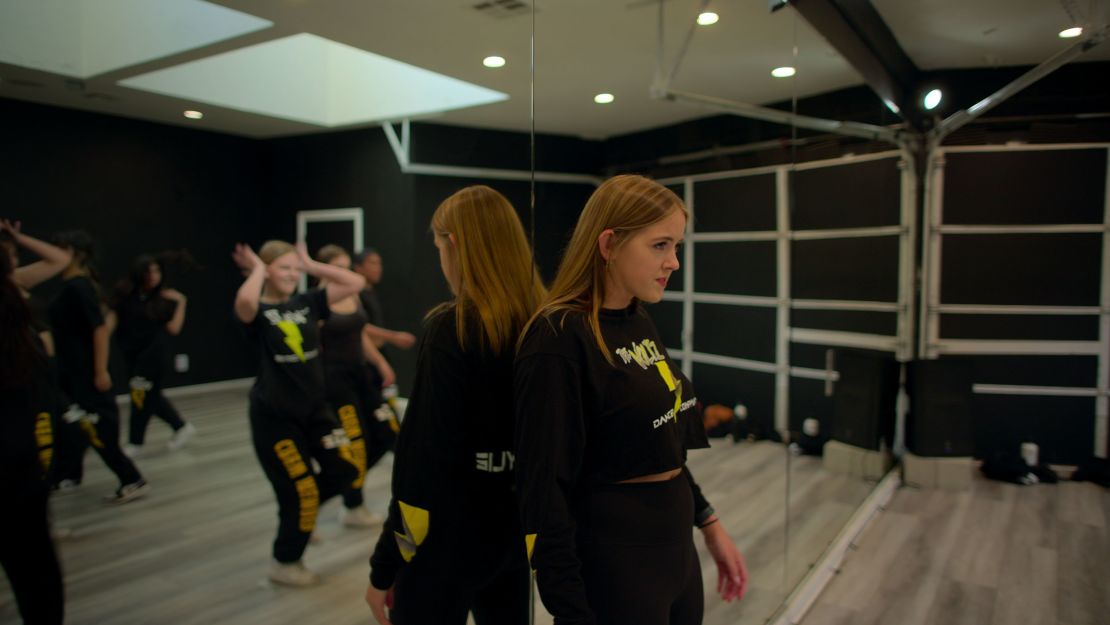Editor’s Note: Keeping you in the know, Culture Queue is an ongoing series of recommendations for timely books to read, films to watch and podcasts and music to listen to.
Over two years ago, a 40-minute-long public plea made on Instagram Live rippled across social media. In the video, TikTok dancer Melanie Wilking and her parents claimed they had lost all contact with her 25-year-old sister, Miranda — now, Miranda Derrick — to a “religious organization” and that she was “no longer in control” of her life.
Melanie and Miranda had performed together as the Wilking Sisters, but the family said Derrick had disappeared from their lives. She was still living in the public eye, however, including announcing a marriage to fellow dancer James Derrick (known as BDash).
Until then, it’s unlikely that Derrick’s millions of followers would have noticed anything amiss, based on her social media accounts. The Los Angeles-based dancer was regularly posting feel-good, polished videos of modern choreography to throwbacks hits with BDash and a small-knit group of fellow dancers and creators. She had walked the red carpet at the American Music Awards in November 2021, and just days before her family shared their video message, appeared on The Ellen DeGeneres Show.
But in the time since, reports from multiple publications, including The Cut and Rolling Stone, as well as an ongoing lawsuit, and now, a Netflix documentary, have revealed troubling claims about the mysterious religious organization the Derricks joined, and how it allegedly doubles as a talent management company called 7M Films.
In the new three-part docuseries “Dancing for the Devil: The 7M TikTok Cult,” the Wilking family is joined by a handful of dancers formerly represented by 7M Films — who are in civil litigation with its co-owner and CEO, Robert Shinn — to speak up about their experiences. They include Kevin “Konkrete” Davis, who rose to fame in the dance community alongside BDash, Aubrey Fisher and Kylie Douglas. Davis, Fisher and Douglas collaborated with the Derricks regularly on dance videos during their time with 7M and had amassed millions of combined followers across TikTok and Instagram.
Shinn, an LA pastor — whose son, Isaiah Shinn, films the Derricks’ content — founded 7M alongside his long-running Shekinah Church; “Dancing for the Devil” asserts the two entities are one and the same, with Shinn and his wife, Hannah, enriching themselves from their church members and talent while isolating them from their previous lives. (7M Films made a public statement in 2022 asserting that it is “operate(d) separately and apart” from Shekinah Church.)
According to the series, which also features former members of the church, Shinn first began Shekinah as a religious community for Korean Americans, then founded 7M as an off-shoot business for Internet-famous dancers, promising them fame and wealth in addition to religious salvation. First-hand accounts and recordings of Shinn’s sermons detail how he asked members to “die to” their families, or cut them off, in order to save their loved ones in the afterlife. Wilking, too, had attended dinners hosted by Shinn along with her sister, but, sensing red flags, she declined to go to his invite-only church services, she explained in the series.

“It was an opportunity to tell a story in real time — an active story that was still unfolding in front of our eyes,” said the docuseries’ director, Derek Doneen, in a video interview with CNN. “Before we started shooting, the (featured) dancers were still in (the organization).” Many of the people who became subjects in the show were people that we didn’t ever really know if we’d get the opportunity to meet and talk to and feature.”
Twin stories, broken families
“Dancing for the Devil” largely follows the parallel stories of two pairs of sisters who were allegedly separated by Shinn’s organizations: Wilking and Derrick, and Melanie and Priscylla Lee. The latter two joined Shekinah as young immigrants in 1999 and became dependent on it for housing and work (Priscylla has since changed her last name to Leigh). They lost contact for years when Melanie left the church — with the help of a friend? — and Priscylla stayed.
“For (Melanie Lee) to come forward — I’m just so appreciative of her strength and trust in us,” said the documentary’s executive producer Jessica Acevedo, explaining that she was initially wary. “She expressed that she has her sister still in there, and (she) feared for her.” Over the course of production, Priscylla left Shekinah, too, and shared her story.
The Shinn family and the Derricks did not participate in the docuseries, though Miranda has stated on social media that she is “not in a cult.” BDash described 7M as a “secular for profit company run by people who have faith in God,” in his own statement. “It is their job to manage/control our bookings or schedules… That is not a cult activity, it’s called doing business.”
“Is it wrong for Christians to be involved in a non faith based entertainment business?” he continued. “If 7M was run by (an) unbeliever, then is it no longer a cult?”
The Derricks and a lawyer for Robert and Hannah Shinn did not return CNN’s request for comment.

The Derricks have also previously refuted claims that she is being kept from her family, framing the situation instead as a personal family dispute. In 2022, a lawyer for 7M Films told Rolling Stone: “It is pathetic and contemptible to try to turn her (Miranda’s) private family matters into a tawdry public scandal for clicks and clout.”
In 2022, Shinn filed a lawsuit claiming defamation and trade libel against several former church members, including the Lee sisters, that alleges the defendants made “false statements” referring to Shinn’s organizations as a cult, and launched a campaign to “cancel” Shinn “through flagrant, defamatory attacks on social and other media.” The following year, Davis, Fisher and Douglas, among others, joined a cross-complaint with the former church members against Shinn, his wife, their entities and other affiliated individuals. The claims accuse them of fraud, forced labor and human trafficking, as well as Robert of sexual battery. The case is scheduled to go to trial in July 2025 in Los Angeles; to date, no criminal charges have been filed.
Today, Derrick is back in contact with her family, occasionally documenting their holidays together on her social media accounts — though the docuseries alleges this is mostly for optics, and that she is still close to Shinn. Derrick did not return CNN’s request for comment about this allegation.
For members who do leave Shinn’s organizations, the documentary makers learned it’s not an easy path, as they follow Priscylla’s struggle to adapt to a new life outside of the church and her pursuit of justice.
“You don’t come out healed; you don’t come out necessarily disavowing many of the teachings,” Doneen said. “That was a bit of a learning curve for me to understand. Once you’re out, it is day one of a very long journey — a very long road to recovery.”
“Dancing for the Devil: The 7M TikTok Cult” is available on Netflix on May 29.
Add to Queue: Dark digital culture
WATCH: “Love Has Won: The Cult of Mother God” (2023)
Through daily livestreams on YouTube, the conspiracy-influenced New Age group Love Has Won, led by a former McDonald’s manager Amy Carlson, recruited members and sold supplements to keep itself afloat. This Max docuseries charts Carlson’s life and death; known as “Mother God,” she died from multiple causes in 2021 including long-term ingestion of colloidal silver, which LHW promoted as a panacea.
(CNN and Max are both operated by Warner Bros. Discovery.)
WATCH: “We’re All Going to the World’s Fair” (2021)
This unsettling coming-of-age film by director Jane Schoenbrun follows one teenager’s descent into a dark realm of the internet through a role-playing game called the “World’s Fair challenge” that purports to cause physical and psychological transformations in real life after following a digital ritual. The creepypasta-influenced film bears similarities to “The Blair Witch Project” and “The Ring,” but is more experimental than conventional horror.
LISTEN: “Rabbit Hole (2020)
A limited podcast from The New York Times, “Rabbit Hole” begins with a three-part segment about a teenager named Caleb who became radicalized by the alt-right, and believes YouTube algorithms led him to increasingly extreme content. This serves as a jumping off point for a broader conversation on what happens when people fall into persuasive rabbit holes online, and how it’s happening on a much larger, polarizing scale.
WATCH: “The Social Dilemma” (2020)
This hit 2020 documentary asserted that our growing addiction to social media platforms is all part of their design, resulting in user bases that are constantly engaged and more easily influenced and exploited thanks to ever-improving predictive algorithms. Four years later, as AI has continued to be integrated into our digital services, the warnings bells have only grown louder.
READ: “Cultish: The Language of Fanaticism” (2021)
If you think you’re impervious to influence from cultlike groups, think again: Chances are you’ve probably been exposed or affected in some way to the language they employ. This book examines the lexicon and branding cults have used to make their ideology appealing and exert control over its members, and how that language has infiltrated more unsuspecting places — including your social media feeds, office or popular gym class.






